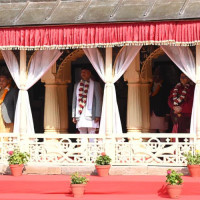- Friday, 23 January 2026
What upsets Nepal’s quest for stability?
By Pallav Bhusal,Kathamandu, Mar. 31: Since the promulgation of a new constitution in 2015, Nepal has embarked on a quest for stability, aiming to overcome its history of political uncertainty and move ahead on the path towards progress and prosperity. However, despite the lofty ideals enshrined within its constitutional framework, the nation continues to grapple with persistent political instability, impeding its journey towards sustainable development and good governance.
The period following the landmark 2017 general elections serves as a microcosm of Nepal’s broader governance challenges. In the span of just a few years, the country has witnessed a revolving door of leadership at the highest levels, with three Prime Ministers – KP Sharma Oli, Sher Bahadur Deuba, and Pushpa Kamal Dahal ‘Prachanda’ – assuming office successively. This rapid turnover in leadership reflects the volatile nature of Nepali politics, characterised by shifting alliances, coalition dynamics, and competing interests.
At the heart of Nepal’s struggle for stability lies a fundamental disconnect between the ideals enshrined within its constitution and the realities of political expediency and manoeuvring.
Khim Lal Devkota, a prominent advocate and member of the Interim Constitution Drafting Committee, former Member of Interim Parliament, and Maoist (Centre) central committee member, identifies several key factors contributing to Nepal’s persistent instability. He points to the immaturity of political parties, compromises in the constitutional framework, and societal divisions exacerbated by partisan interests as primary drivers of the nation’s governance challenges.
“In my analysis, I’ve come to recognise inherent tensions in Nepal’s constitutional journey. Crafted amidst the crucible of political compromise, the constitution emerged as a delicate tapestry woven from the threads of divergent aspirations and competing interests. However, in its quest for inclusivity and consensus, the constitution inadvertently created fault lines that continue to rupture the nation’s political landscape,” said Devkota.
However, Devkota believes that the constitution is still in the initial phase of implementation and will slowly be beneficial in the nation-building process.
The repercussions of Nepal’s political instability extend beyond the central government to the provincial level, where the promise of local governance and autonomy has been overshadowed by a similar pattern of leadership changes and governance challenges. In Koshi Province, for instance, the tenure of chief ministers has been marked by frequent turnover, undermining efforts to foster stability and continuity in governance. Similar trends are observed in other provinces, underlining the systemic nature of Nepal’s governance challenges.
Agni Kharel, a former Minister of Law, Justice, and Parliamentary Affairs and CPN (UML) leader, echoes concerns, emphasising the need for a paradigm shift in political culture and conduct. He contends that Nepal’s political elite have weaponised the constitution as a tool for partisan gain, rather than upholding it as a blueprint for national progress and unity. This instrumentalisation of the constitutional framework has eroded the foundations of democratic governance, undermining public trust and exacerbating the nation’s governance challenges.
“In my view, the path to stability lies not in rewriting the constitution but in a profound transformation of political ethos and practice. I advocate for a renaissance of civic engagement and statesmanship, where elected leaders prioritise the common good over narrow partisan interests, and where the constitution serves as a sacred covenant binding the nation’s diverse populace in a shared vision of progress and prosperity,” said Kharel.
Amidst Nepal’s political turbulence, a critical examination reveals systemic issues plaguing the parliamentary system. The ruling and opposition parties often fail to fulfil their responsibility effectively, leading to a breakdown in governance. The quest for power overrides adherence to constitutional values, ripping the very foundation of democratic practice. Coalition-driven elections have left the parliament fragmented, devoid of a party commanding majority to anchor governance. This departure from constitutional principles has hindered the realisation of political stability envisaged by the constitution. To address these challenges, a concerted effort is needed to uphold parliamentary integrity, ensuring proper separation of powers and robust checks and balances. Only then can Nepal realise the true potential of its constitution and parliamentary practice.
Pushpa Bhusal (Gautam), a former Deputy Speaker of the House of Representatives and Nepali Congress central committee member, offers a pragmatic assessment of Nepal’s parliamentary woes. She contends that the root of the nation’s instability lies not in the constitution itself but in the feeble functioning of its parliamentary institutions. Bhusal laments the absence of robust checks and balances, where ruling parties wield disproportionate power, and opposition voices are marginalised and silenced.
“In my perspective, the key to unlocking Nepal’s democratic potential lies in revitalising its parliamentary democracy, where the principles of transparency, accountability, and inclusivity reign supreme. I call for a reimagining of Nepal’s political landscape, where ruling and opposition parties collaborate in the spirit of constructive dialogue and cooperation, rather than descending into the abyss of partisan brinkmanship,” said Bhusal.
As Nepal stands on the precipice of uncertainty, the road ahead remains fraught with challenges and obstacles. Yet, amidst the cacophony of political discord, there glimmers a faint beacon of hope – a hope born from the resilience of the Nepali people and their unwavering commitment to democracy and progress. In the face of adversity, Nepal has the opportunity to forge a new path forward, one rooted in the timeless principles of justice, equality, and transparency. It is a path fraught with perils, yet brimming with promise – a path that beckons Nepal towards a brighter and more prosperous future for all.
Nepal’s journey towards stability and prosperity is intricately intertwined with the evolution of its constitutional framework and the cultivation of a political culture that prioritises the common good over narrow interests. As the nation grapples with the challenges of governance, it must confront the underlying systemic issues that perpetuate instability and division. Only through concerted efforts to strengthen democratic institutions, foster inclusive governance, and uphold the principles of transparency and accountability can Nepal realise its full potential and emerge as a champion of democracy and progress in the region.



-original-thumb.jpg)


1662885410-original-thumb.jpg)









